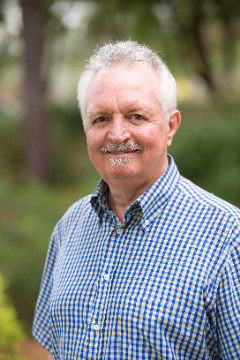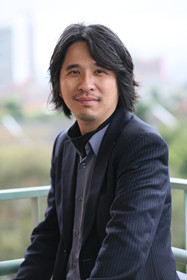|

Prof. David Gibson
Director Learning Futures,
Curtin Teaching and Learning (CTL)Curtin University,Australia
|
Title : Linking Digital Experience to the Science of Learning through Analytics
Abstract :
A learner’s digital experience in higher education today can create and utilize big data at all levels spanning from the processes of recruitment to the graduation of globally enabled work-ready leaders. Central to these processes, learning and teaching is rapidly being transformed through innovative use of complex multidisciplinary analytics. The Insight Centre for Learning Analytics at Curtin University is exploring, creating and harnessing innovative curriculum and assessment methods that link learning experiences to the science of learning. This address will share theory, approaches and findings from this frontier of research and development.
Speaker’s Biography:
Associate Professor David Gibson holds an Ed.D. in Leadership and Policy Studies from the University of Vermont. Gibson’s experience in education research and development began in earnest in two ways, one personal and the other public. At the personal level, as a musician (piano, B.Mus. in Composition in 1973) he began to study the psychoacoustics of sound, following the sound wave to the ear drum, then the brain, and back out via interpretation and aesthetic experience. He scored films and musical theater in Los Angeles in the mid-seventies (one of his music scores was nominated for an Academy Award in 1973 for a short film), while reading philosophy, probability and group theory in mathematics, and literature on emerging digital media culture. This personal journey continues to this day, and now connects to readings in artificial intelligence, cognitive science, and learning theory. The public journey began by working with three Governors of Vermont to create and sustain a transformative new entity for Science, Technology Engineering, and Mathematics; to a research professorship at the University of Vermont, followed by an appointment at Arizona State University and then Curtin University.
For further information, please visit his personal homepage: https://ctl.curtin.edu.au/global/dir_directors.cfm/David.C.Gibson
|
|

Prof. Mark Pegrum
Associate Professor,
The Faculty of Education,
The University of
Western Australia,
Australia
|
Title: Developing Mobile Literacy
Abstract :
Mobile literacy is rapidly becoming the key digital literacy for learning, working and living in the 21st century. It is a macroliteracy, composed of other more particularised literacies. They include long-established literacies like information and multimodal literacy, which are taking on greater prominence thanks to mobile devices. Theyinclude newer literacies like network and code literacy, which are coming into their own in the contemporary era. They include literacies which are just beginning to emerge, such as data literacy. Interwoven with all of these literacies, there must also be a strong element of critical mobile literacy. Mobile learning opens up the possibilities for active, collaborative, situated learning at all levels of education. At the same time, it opens up both the need and the opportunity to help students acquire the mobile literacy skills which are essential not only to supporting their learning, but to supporting their working and personal lives in an ever more mobile world.
Speaker’s Biography:
Mark Pegrum is an associate professor in the Faculty of Education at The University of Western Australia, where he specialises in mobile learning and, more broadly, e-learning. His teaching has been recognised through Faculty and University Excellence in Teaching Awards, as well as a national Australian Learning & Teaching Council (ALTC) Excellence in Teaching Award. His current research focuses on mobile technologies and digital literacies. His recent books include: Brave New Classrooms: Democratic Education and the Internet (co-edited with Joe Lockard; Peter Lang, 2007); From Blogs to Bombs: The Future of Digital Technologies in Education (UWA Publishing, 2009); Digital Literacies (coauthored with Gavin Dudeney & Nicky Hockly; Pearson/Routledge, 2013); and Mobile Learning: Languages, Literacies and Cultures (Palgrave Macmillan, 2014). He is an Associate Editor of the International Journal of Virtual and Personal Learning Environments, a member of the Editorial Boards of Language Learning & Technology and System, and a member of the Review Panel of the International Journal of Pedagogies and Learning. He is also a member of the Advisory Committee for theVirtual Institute for Research into Online Language Learning (VIROLL), a member of the Advisory Board for the Digital Education Show Asia, and a member of the Programme Committee for the International Mobile Learning Festival. He currently teaches in Perth,Hong Kong and Singapore, and has given presentations and run seminars on e-learning and m-learning in Australia and New Zealand, Asia and the Middle East, the UK and Europe, and South America.
Further details can be found on his wiki at:
|
|

叶丙成教授
Director,MOOC,NTU
Professor,
Dept. Electrical Engineering,
National Taiwan University,
Taiwan
|
Title: Gamification for Education
Abstract :
How to keep our students engaged and motivated to the class, is a crucial question for all instructors. Gamification is very useful in raising students’ motivation toward learning. Prof. Yeh started working on gamification for his on-campus courses since 2010. He has developed numerous games and tools for his courses with great success. Due to his great design in gamification for education, Prof. Yeh and his team were awarded the Overall Award of the Wharton-QS “Reimagine Education” among 427 teams from 43 countries. It is one of the most prestigious award for innovations in higher education. In this talk, Prof. Yeh will provide case studies of his various course designs with in-depth details. Similar approaches can be generalized to other courses to make students more engaged and motivated toward learning.
Speaker’s Biography :
Prof. Ping-Cheng (Benson) Yeh is a world’s leading innovator in teaching with numerous pioneering achievements: He is the first to win the Overall Award and E-Learning Award in Wharton-QS 2014 Stars Awards: Reimagine Education, the “Oscars” of innovations in higher education, the first to design a MOOC-based multi-student social game, the first to design a serious online game for any general courses, the first to make MOOC in Chinese with 50,000+ students, the first to design experiential learning schemes with college students graded by 12-year old kids on presentation skills and set a record of 2,236 teachers attending his speech of flipped teaching. Since 2010, Prof. Yeh has been a strong advocator of his teaching philosophy: “by the students, for the students, of the students”. It states that students can be motivated to learn if the teachers can share more responsibility with the students, for instance, let students design their own homework problems. Prof. Yeh’s speeches have motivated many teachers in different countries to start thinking differently in teaching.
|




